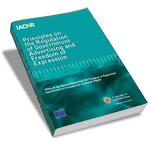Freedom of Expression
Government Advertising
Basic Principle
Declaration of Principles on Freedom of Expression adopted by the Inter-American Commission on Human Rights in 2000.
“Other Forms of Censorship,” presentation of Don Podesta, Consultant and former Editor of The Washington Post
Special Session of the Permanent Council of the OAS regarding the Right to
Freedom of Thought and Expression and the Importance of Communications Media.
Date: April 23, 2009
Case Law
Publication
 Principles on the Regulation of Government Advertising and Freedom of Expression (2012)
Principles on the Regulation of Government Advertising and Freedom of Expression (2012)
This publication seeks to carry out a systematic analysis of Inter-American rulings on freedom of expression, particularly of the orders for reparation issued as of October 2011 in cases which have involved violations or illegitimate restrictions of the freedom established in Article 13 of the Convention.

